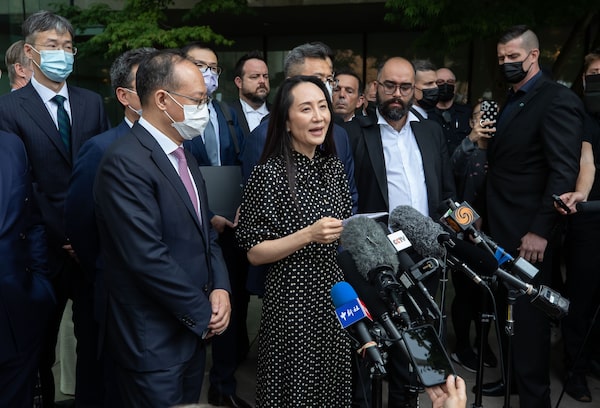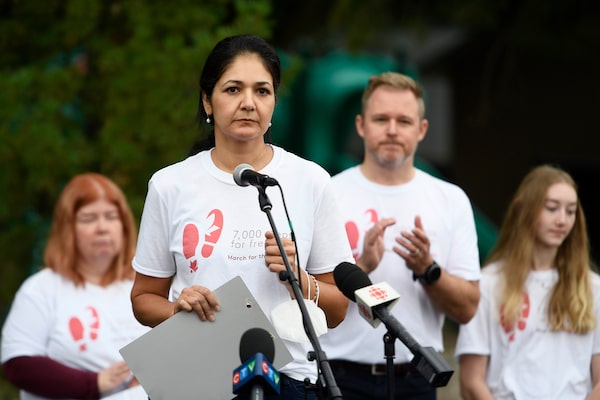
Prime Minister Justin Trudeau greets Michael Kovrig, facing camera at left, and Michael Spavor, facing camera at right, on the tarmac at Calgary's airport early Saturday morning in a video still obtained from CTV News.
Kovrig and Spavor: The basics
Michael Kovrig is greeted by his wife Vina Nadjibulla on the tarmac at Pearson Airport in Toronto on Sept. 25, 2021.J.P. MOCZULSKI/The Globe and Mail
Who they are: Michael Kovrig is a former Canadian diplomat who was in China working as an analyst and researcher for a think tank called the International Crisis Group. Michael Spavor is an entrepreneur who has worked to promote business and cultural ties between North Korea and the West. On Dec. 10, 2018 – days after Canada’s arrest of Huawei executive Meng Wanzhou on a U.S. extradition request – they were separately detained in China and accused of breaking national-security laws.
How long they were in Chinese custody for: Mr. Spavor and Mr. Kovrig were detained in China for 1,020 days. In a dramatic reversal for China, hours after the case against Ms. Meng had been dropped, Prime Minister Justin Trudeau announced Sept. 24, 2021, that the two Canadians were headed home. Beijing had long dismissed Ottawa’s accusations that they were victims of “hostage diplomacy,” saying there was no link between their detention and the extradition case against Ms. Meng.
What China accused them of: The men were charged with espionage, but it took more than 18 months after their arrests for those charges to be formally laid. They deny the allegations. Each was tried in secret in March of 2021 (March 19 for Mr. Spavor, March 22 for Mr. Kovrig) with little notice given to the Canadian government; six months later, Mr. Spavor was found guilty and sentenced to 11 years in prison. Prior to their release, Mr. Kovrig had been awaiting a verdict. In China’s judicial system, verdicts can be delayed for years, but nearly 100 per cent of tried cases end in conviction.
What their detention was like: Mr. Kovrig was being held in Beijing and Mr. Spavor in Dandong, and neither one has had much access to the outside world. The Globe’s Asia correspondent visited their prisons a year after their detention, learning they were interrogated for months in solitary confinement-like conditions; guards initially seized Mr. Kovrig’s glasses; and their lights were kept on 24 hours a day. China’s COVID-19 epidemic later made them even more unreachable, even by Canadian consular staff, because prisons were closed to visitors. Correspondence obtained by The Globe added more details about how the men have been keeping busy and what books and materials they’ve sought.
Michael Kovrig flew into Toronto on Saturday and spoke briefly to waiting reporters. With his wife, Vina Nadjibulla, by his side, Kovrig said it was fantastic to be back home in Canada.
The Globe and Mail
A who’s who
The Chinese side

Meng Wanzhou, chief financial officer of Huawei, reads a statement outside B.C. Supreme Court in Vancouver, on Sept. 24, 2021. Ms. Meng struck a deal with the U.S. Department of Justice, in which she accepted a significant portion of the U.S. government’s case against her.DARRYL DYCK/The Canadian Press
Meng Wanzhou: The chief financial officer of Huawei Technologies, a Chinese telecom company, Ms. Meng was arrested at Vancouver’s airport in December, 2018. U.S. prosecutors accused her of lying to financial institutions as part of a scheme to circumvent U.S. sanctions on Iran and do business there through a subsidiary. On Sept. 24, 2021, she cut a plea deal with the U.S. Department of Justice that allowed her to return to China, nearly three years after she was detained. In the deal, she accepted a significant portion of the U.S. government’s case against her, but did not have to pay a fine or enter a guilty plea. The Huawei executive left Vancouver that evening on an aircraft bound for Shenzhen, China, where she arrived to a hero’s welcome.
Huawei CEO Ren Zhengfei gives an interview in Shenzhen, China, in December, 2019.Theodore Kaye/The Globe and Mail/The Globe and Mail
Ren Zhengfei: Ms. Meng’s father founded Huawei, became a billionaire as he expanded its reach abroad and is now aiming to make it the dominant global player in 5G wireless networks. Its technology is under intense global scrutiny by the United States and its allies over fears that it could be used for Chinese espionage. Mr. Ren had offered to help arrange Mr. Kovrig and Mr. Spavor’s freedom in exchange for his daughter’s release.
Cong Peiwu: As ambassador to Canada, Mr. Cong was a key figure in Beijing’s efforts to win Ms. Meng’s release and convince Canada that Huawei’s technology is safe.
Wang Yi: China’s Foreign Minister had talked several times with his Canadian counterpart about Mr. Kovrig and Mr. Spavor.
The Canadian side

Dominic Barton gives an interview to The Canadian Press in 2016.Paul Chiasson/The Canadian Press/The Canadian Press
Dominic Barton: Canada’s ambassador to China took his job in the middle of the Kovrig-Spavor saga after his predecessor, John McCallum, was fired in January, 2019, for suggesting to Chinese-language media that Ms. Meng had a chance of avoiding extradition to the United States. Mr. Barton became the detainees’ main advocate in China.
Marc Garneau: Canada’s Foreign Affairs Minister had been trying to secure Mr. Spavor and Mr. Kovrig’s release in talks with the Chinese and U.S. governments.
Vina Nadjibulla: Mr. Kovrig’s wife was a vocal advocate for the men’s release, coming forward in June of 2020 with letters from her husband in which he described how he’s trying to stay resilient and hopeful. “We cannot at the moment allow the real suffering of these Canadians to continue,” she says.

Vina Nadjibulla, wife of Michael Kovrig, stands with Paul Spavor, second from right, brother of Michael Spavor, as she speaks before the start of the March for the Michaels, marking the 1,000 days since Canadians Kovrig and Spavor were detained in China, in Ottawa, on Sept. 5, 2021. The two were released on Sept. 24, 2021.Justin Tang/The Canadian Press
More reading
Campbell Clark: Beijing finally releases two Michaels, but a hard lesson can’t be forgotten
Inside the final hours that led to the arrest of Meng Wanzhou

Well wishers shout and wave Chinese national flags after Huawei executive Meng Wanzhou, left, arrived in Shenzhen after her release from house arrest in Canada.-/AFP/Getty Images
Compiled by Globe staff
With reports from Nathan VanderKlippe, Steven Chase, Robert Fife, James Griffiths and The Canadian Press
Know what is happening in the halls of power with the day’s top political headlines and commentary as selected by Globe editors (subscribers only). Sign up today.